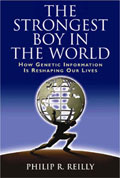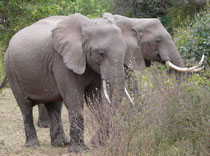 |
||||
| Biology Home | News | Calendar | Make a Gift | UW Alumni | ||||
|
Spring 2009 | Return to issue home
Visit Biology in 2009 Spring Science Book Club
This spring Biology Professor Toby Bradshaw hosts our first science book club. To jump-start this new event, Bradshaw has selected Philip R. Reilly’s new book The Strongest Boy in the World: How Genetic Information Is Reshaping Our Lives, a collection of 20 stories that give readers a better understanding of genetics, genomics and stem-cell biology. Read Amazon’s description of the book. Please note: Although the book club started prior to the release of this E-newsletter, those who are interested are invited to attend remaining book club discussions. For more information about the club, please call (206) 685-2185 or e-mail kbrady@u.washington.edu. There is no cost to attend, however attendees must provide their own copy of the book. Copies are available for purchase at the University Book Store. 1st Annual Biology Lecture for Alumni & Friends By popular demand, UW Biology is launching an annual lecture for alumni and friends! Biology Professor Sam Wasser will give the first lecture, titled "Using DNA Forensics to Combat the Burgeoning illegal Ivory Trade." Wasser is a world-renowned conservation biologist and holds the University of Washington’s Endowed Chair in Conservation Biology and is the director of the Center for Conservation Biology.
Abstract: The illegal ivory trade has returned with a vengeance. A higher percentage of the remaining elephants are now being killed from poaching than at any time in history. The trade has taken on a new face, being driven primarily by large organized crime syndicates. Our Center has developed genetic tools to track the origin of poached ivory across Africa. We are using these methods in collaborative investigations with INTERPOL to determine the origins of large ivory seizures that bear the signature of organized crime. This enables us to transfer responsibility for policing the trade back to source countries. This strategy prevents new ivory from entering the global market where the complex web of criminality makes it nearly impossible to trace. It allows poor countries to focus their limited law enforcement resources on the most critical poaching hotspots. And it forces key source countries to take responsibility for the extent of poaching in their countries. Perhaps most important, it is one of the few methods that can keep the elephants from being killed in the first place. RSVP to attend by calling (206) 685-2185 or e-mail uwbio@u.washington.edu. We look forward to seeing you on April 22! Biology Networking Night
Call (206) 685-2185 or e-mail uwbio@u.washington.edu if you are interested in being a panelist! All event information is posted on our department Web site and on our new biology alumni Web site. Stay tuned! Spring 2009 | Return to issue home |
||||
|
||||


